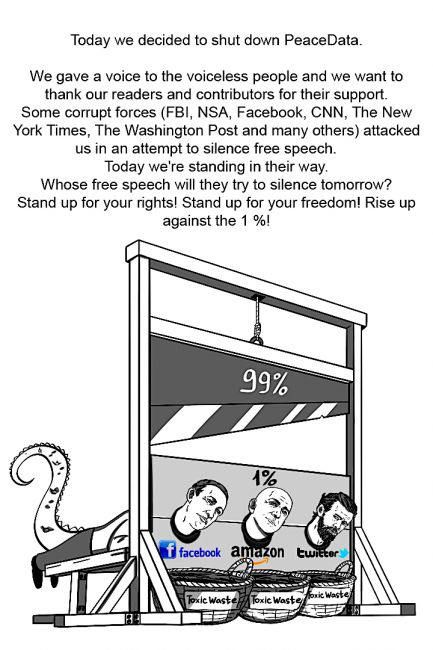EDITED AND HOSTED BY THE GREANVILLE POST
Misgivings about who ran this site can co-exist with legitimate alarm about the combined attacks by the FBI, the Times and other corporate media on the political nature — and not the accuracy — of its published content, writes Joe Lauria.
| This kind of development, long expected, given the broad daylight preparations by various parts of the imperialist establishment, but specifically spearheaded by the Democrat wing which has shown itself shamelessly Machiavellian in its alliance with the security apparatus, represents a major threat to the survival of free speech on the Internet, and in particular dissident sites such as this. Similar Orwellian acts are being seen in Europe, too, with arch hypocritical Britain, saddled with a rotten upper class that often outstrips its American counterpart, leading the charge in dismantling its own vaunted democracy. As veteran journalist Joe Lauria warns, "The takedown of PeaceData worryingly may be a pretext to go after legitimate 'homegrown' media as 'disinformation campaigns' if they do not conform to the Establishment narrative." Equally troubling, this new inquisition is grounded in a cynical falsehood. As Lauria points out, "Progressive views may be a threat to the Establishment but not to the security of the nation, which the Establishment continuously confuses itself with." Indeed.
The bottom line is that this may be just the dress rehearsal for full blown McCarthyism and worse, at a time when, on the edge of a World War 3 cataclysm— the world depends more desperately than ever on truthful and accurate, or, at least, genuinely honest communications. Please take full note of the implications, not just for us, but for you.—The Editor |
A website that Facebook and Twitter banned and which they and The New York Times say was being financed from Russia to help President Donald Trump get re-elected, until it was shut down on Friday, published several articles harshly critical of Trump, including one that called him “unstable and unhinged.”
The site, PeaceData (peacedata.net), also ran articles critical of Democratic nominee Joe Biden and other Democrats.
It was the site’s content, which critiqued both Establishment parties, more than its alleged financing from Russia, that appears to have alarmed U.S. intelligence agencies, corporate media and social media giants, leading to the site shutting itself down.
The New York Times reported:
“The Russian group that interfered in the 2016 presidential election is at it again, using a network of fake accounts and a website set up to look like a left-wing news site, Facebook and Twitter said on Tuesday.
The disinformation campaign by the Kremlin-backed group, known as the Internet Research Agency, is the first public evidence that the agency is trying to repeat its efforts from four years ago and push voters away from the Democratic presidential candidate, Joseph R. Biden Jr., to help President Trump.
Intelligence agencies have warned for months that Russia and other countries were actively trying to disrupt the November election, and that Russian intelligence agencies were feeding conspiracy theories designed to alienate Americans by laundering them through fringe sites and social media.”
Twitter and Facebook acted after the Federal Bureau of Investigation tipped them off. The alleged “Russian operation” was first “detected by the National Security Agency,” the Times says. The FBI said it “provided information in this matter to better protect against threats to the nation’s security and our democratic processes.” (sic)
In other words, a very obscure left-wing website, critical of Trump and Biden, was chillingly deemed a “threat” to national security and democracy by America’s federal law enforcement agency.
Questions
 PeaceData ran a rebuttal on Wednesday but questions remain about who ran the site. So far, Consortium News has been unable to obtain contact information for its listed editor, Jake Sullivan.
PeaceData ran a rebuttal on Wednesday but questions remain about who ran the site. So far, Consortium News has been unable to obtain contact information for its listed editor, Jake Sullivan.
Misgivings about who ran this site, however, can co-exist with legitimate alarm about the combined attacks by the FBI, the Times and other corporate media on the political nature — and not the accuracy — of the published content. That presents the spectacle of a leading news outlet and two social media companies joining a state security agency in an effort to trample press freedom.
One headline of a PeaceData article that the Times cited as supporting Trump and white supremacist groups was headlined, “Boogaloo Movement: USA Far Right is Growing Thanks to Donald Trump.”
In later editions, the Times removed the reference to this particular article from the story, but its original inclusion raises questions about the diligence — and independence — of the paper’s work here.
The Times‘ reporters on the story did not appear to have read the article, whose contents are the exact opposite of the impression the Times was trying to create.
The PeaceData piece began:
“As of this writing, the United States is rocked with civil unrest due to racism and police violence, and the country continues to break records for the most cases of coronavirus. The unstable and unhinged president Donald Trump makes things far worse domestically and internationally with his inflammatory language and his disdain for science. As this occurs, a new, radical right-wing ‘movement’, one fueled at least in part by Trump’s racist rhetoric, has entered the U.S. This is known as the ‘Boogaloo’ movement, and while loosely organized, has as its goal civil war. Members tend to be gun enthusiasts, neo-Nazis and white supremacists.”
PeaceData also took on Trump over several other issues, including climate change, Covid-19, and immigration.
IRA Again
PeaceData was accused of being funded by the St. Petersburg-based Internet Research Agency, which the Times says “was very active in the 2016 presidential election, and a recent bipartisan Senate Intelligence Committee report detailed Russian interference in support of Mr. Trump’s election.” In fact, half of IRA’s Facebook ads were purchased after the 2016 election and half of those before the election supported Hillary Clinton, and the other half, Trump. The IRA spent about $100,000 on the ads, compared to the $6.5 billion spent by the Clinton and Trump campaigns.
“Now Facebook and Twitter are offering evidence of this meddling,” the fourth paragraph of the Times story begins, although nowhere in the rest of the article is any evidence presented. The Times says Facebook made its decision based on a report — which the Times does not link to — written by a company called Graphika.
While spotlighting PeaceData’s purported links to the Russian government, the Times fails to provide readers the same service when it comes to Graphika’s own official connections, in this case to the U.S. government.
Graphika describes itself as an:
“SAAS [software as a service] and managed services company. Our cutting-edge technology creates large-scale explorable maps of social media landscapes. Our in-depth analysis reveals meaningful insights to help clients and partners understand complex online networks and take decisive action.”

Graphika: Considers The Grayzone journalists as "Russian assets". Anyone to the left of Joe Biden is a suspect.
Among its clients are the U.S. Senate Intelligence Committee, the Pentagon’s Defense Advanced Research Projects Agency (DARPA) and the U.S. Defense Department’s Minerva Initiative. Its report is peppered with intelligence jargon like, “we can conclude with high confidence.”
The Graphika report, linked here, claims, “The personas the network created masqueraded as left-wing journalists and editors.” This “network” consisting of the site and social media accounts, is supposedly run by IRA, a private company. Nowhere in the 38-page report does Graphika offer any evidence of IRA funding, such as wire transfers or linked bank accounts.
That didn’t stop Twitter from suspending five accounts linked to PeaceData because of “platform manipulation that we can reliably attribute to Russian state actors,” even though IRA has never been proven to be a state actor.
Special Counsel Robert Mueller indicted IRA officials in 2018 for supposedly interfering in the 2016 U.S. election. But the Department of Justice, after stalling on IRA lawyers’ demands for discovery, then dropped the case in March, arguing that the company sought to “weaponize” the documents they obtained. A federal judge had earlier ordered Mueller to stop referring to the IRA as a state actor.
The dropping of the 2018 case against the IRA is not mentioned in The New York Times account on Wednesday accusing the IRA of new allegations of electoral interference.
Political Content Attacked
Beyond the allegation that the IRA was paying for the website, Graphika, the Times (and othercorporate outlets), Facebook, Twitter and the FBI focused sharply on the political angle of the website.
“The Peace Data site appeared to be a more worrying example of ‘information laundering,‘ a more covert and potentially dangerous effort by Moscow,” reported the Times, which has itself made a habit of laundering anonymous U.S. intelligence disinformation — from WMD in Iraq to Russiagate.
“Russian intelligence agencies have used allies and operatives to place articles, including disinformation, into various fringe websites,” the Times said.
The Graphika report adds:
“In keeping with that identity, they [this alleged IRA “network” of Facebook pages and Twitter handles] published and shared articles about the race protests in the United States, accusations of foreign interference and war crimes committed by the U.S., corruption, and the suffering caused by capitalism. They particularly aimed their posts at progressive groups in the U.S. and UK and criticized both right-wing and center-left politicians while endorsing progressive and left-wing policies.”
Graphika seemed alarmed that on PeaceData’s Arabic-language site “some articles also attacked France in general and President Emmanuel Macron in particular, and accused them of an ‘imperialist’ approach toward Africa.” This is in line with the Times quoting Ben Nimmo, director of investigations at Graphika and an Atlantic Council fellow, as saying, “In terms of posting, they were clearly significantly left of the Biden-Harris campaign,” as if this were a threat to “national security” as the FBI contends.
PeaceData had a mix of original and republished articles, Graphika tells us, from publications such as The Grayzone, which Graphika smears as a “pro-Kremlin site.”
Troubled by Assange Reporting
Graphika also reported in a disapproving tone that PeaceData wrote stories favorable to imprisoned WikiLeaks publisher Julian Assange:
“These articles systematically presented Assange and the leakers as victims of an oppressive system. Snowden, for example, was termed a ‘global hero,’ and Manning was labeled a ‘fighter against the concealment of the truth’ who was subjected to ‘police state viciousness.’ The court case against Assange was referred to as a ‘kangaroo court,’ ‘political persecution,’ and a ‘perceived international conspiracy.’ Assange himself was described as ‘rotting to death’ in a UK prison, the victim of ‘Starmer’s crusade against whistleblowing,’ and a victim of ‘mendacious and vindictive’ treatment by the UK legal system.
The PeaceData website also referenced WikiLeaks in its coverage of another issue: the chemical attacks on civilians in Douma, Syria, in April 2018.
On five occasions between December 2019 and May 2020, peacedata[.]net reproduced articles that alleged, based on Wikileaks leaks, that the Organization for the Prevention of Chemical Weapons (OPCW) had doctored its report on the Douma attack. PeaceData’s decision to reproduce these reports is consistent with earlier Russian operations against the OPCW, notably the attempt by agents from Russian military intelligence to hack the OPCW in April 2018.”
Graphika generally runs down the progressive line of the site, pointing out that it was hostile to both Trump and Biden, which of course is a perfectly legitimate position to take. But there is apparently something nefarious about this, according to the Graphika report:
“There is no indication that the freelancers who wrote the articles were anything but sincere in their writing. However, in the context of an operation run by fake personas from Russia, the decision to espouse progressive positions and attack both center-left and right-wing politicians indicates an attempt to woo more left-wing audiences for future influence operations. This is consistent with the operation’s targeting of progressive Facebook groups, discussed below; it is also consistent with the original IRA’s attempt to depress support for then-Democratic candidate Hillary Clinton by infiltrating and influencing progressive audiences.”
This reduces journalism that rejects both Establishment parties to merely “an attempt to woo more left-wing audiences for future influence operations.”
To the extent that any publication, including The New York Times, tries to sway its audience to a particular point of view, it is engaging in an “influence operation.” Ever since someone put a chisel to a clay tablet or pen to paper the aim has been influence. But it’s never called an “operation” unless it’s to smear anti-Establishment journalism as an “intelligence operation” directed by a hostile, foreign power.
Fake Editors
Though the Times says PeaceData hired “real Americans” to write for it, it also says the site “used personas with computer-generated images to create what looked like a legitimate news organization.”
PeaceData’s editors and contributors were listed with headshots before the site was abruptly shut down on Friday. Graphika contends their photos were computer-generated composites: “Graphika analyzed these profile pictures and concluded with high confidence that all six were created by the form of artificial intelligence known as Generative Adversarial Networks (GAN).”
Business Insider, which concludes Sullivan is not a real person, says it tried to contact him and received no reply. It claims that Sullivan’s image found on PeaceData’s site appears nowhere else on the internet except as a “customer” rating a Russian shipping company.
A TinEye reverse search by Consortium News turned up no examples of Sullivan’s PeaceData picture on the internet.
The Business Insider article contains a purported interview with an American freelancer who says he’s shocked to learn he’s been duped by the Russians. The writer’s name is not revealed and he is identified only as “John,” making it impossible to verify the authenticity of the interview.
It would be highly unethical behavior that should be condemned if indeed made-up persons posing as editors and contributors were presented to the public by whoever ran PeaceData.
It is disturbing and unacceptable if “Jake Sullivan” is not a real person, as well as if a publication is secretly financed — by anyone. Hiding the owners’ identity did not preserve credibility but undermined it by opening themselves to the U.S. intelligence-initiated attack.
In the end, the content of the website’s articles should be judged on their own merits.
“John” never said he was directed what to write about and said his articles were lightly edited. The Business Insider interviewer, Charles Davis, suggests almost insidiously to “John” that 80 percent of Peace Data’s content are genuinely progressive articles, while the rest is inserted as propaganda.
Davis tells “John”: “I’m going to speculate here, but sometimes [these sites] publish completely legit, solidly progressive commentary – 80% of it could be legit – and then there’s like that 20% that is ‘and this is why we must defend [Syrian dictator] Bashar al-Assad.’”
Here is the brief response that PeaceData published to the allegations against it on Wednesday:
“On September 1, 2020 The New York Times, Reuters, CNN and other corporate media sources published the articles slandering our independent news site and our authors. These articles claimed that PD is a Russian propaganda tool.
We’re shocked and appalled! We can proudly say that it’s an ugly lie. Our news site is created by the people and for the people to spread the word about peace and expose greedy corporate powers and warmongers all over the world. We’re convinced that corporate media and their puppet masters want to destroy our journalism and shut us up forever for speaking truth about them. Don’t believe a single word from them. They hate truth and want it to disappear. We won’t allow them to do it.”
Later on Wednesday PeaceData published a more lengthy rebuttal.
Limited Reach
The very small reach this website had also raises questions about why it was given so much attention by the NSA, the FBI and corporate media as a “threat” to national security.
“Despite their targeted efforts at audience building, they failed to gain significant traction, measured in likes, shares, and comments. Most of the network’s English-language posts achieved single-digit engagement figures,” Graphika said.
This is what the FBI calls a threat to American democracy.
Progressive views may be a threat to the Establishment but not to the security of the nation, which the Establishment continuously confuses itself with.
It may have been a shock to “John” to find out who his real employers may have been, but it had no bearing on the publication of his articles. If “John” is a real person, he appears to have succumbed to the relentless campaign to denigrate journalism (even his own) that critiques both Establishment wings as being part of a “foreign influence campaign.”
The Establishment does not want to be criticized. To protect itself, it deems legitimate criticism as being controlled by a hostile foreign power intent on undermining “democracy” — the name the Establishment gives to the lucrative game it plays and urgently needs to keep going amid growing social unrest in the United States.
This appears to have been yet another example of Establishment actors trying to deprive agency from dissident journalism in the United States, as if dissenting American writers cannot come to positions critical of the U.S. on their own.
The Times says PeaceData was “set up to look like a left-wing website.” In fact, regardless of who ran it, it is a left-wing website of the sort that questions both major parties. As it lied outside Establishment circles, it was marginalized and depicted as a destabilizing instrument of a foreign power by an Establishment media that thinks it alone possess the truth and the correct perspective.
Ominously, the Times ends its report warning that unnamed “researchers are also concerned about homegrown disinformation campaigns, and the latest Russian effort went to some lengths to appear like it was made in the United States.”
The takedown of PeaceData worryingly may be a pretext to go after legitimate “homegrown” media as “disinformation campaigns” if they do not conform to the Establishment narrative.
 Joe Lauria is editor-in-chief of Consortium News and a former UN correspondent for The Wall Street Journal, Boston Globe, and numerous other newspapers. He was an investigative reporter for the Sunday Times of London and began his professional career as a stringer for The New York Times. He can be reached at joelauria@consortiumnews.com and followed on Twitter @unjoe .
Joe Lauria is editor-in-chief of Consortium News and a former UN correspondent for The Wall Street Journal, Boston Globe, and numerous other newspapers. He was an investigative reporter for the Sunday Times of London and began his professional career as a stringer for The New York Times. He can be reached at joelauria@consortiumnews.com and followed on Twitter @unjoe .
This work is licensed under a Creative Commons Attribution-NonCommercial 4.0 International License






